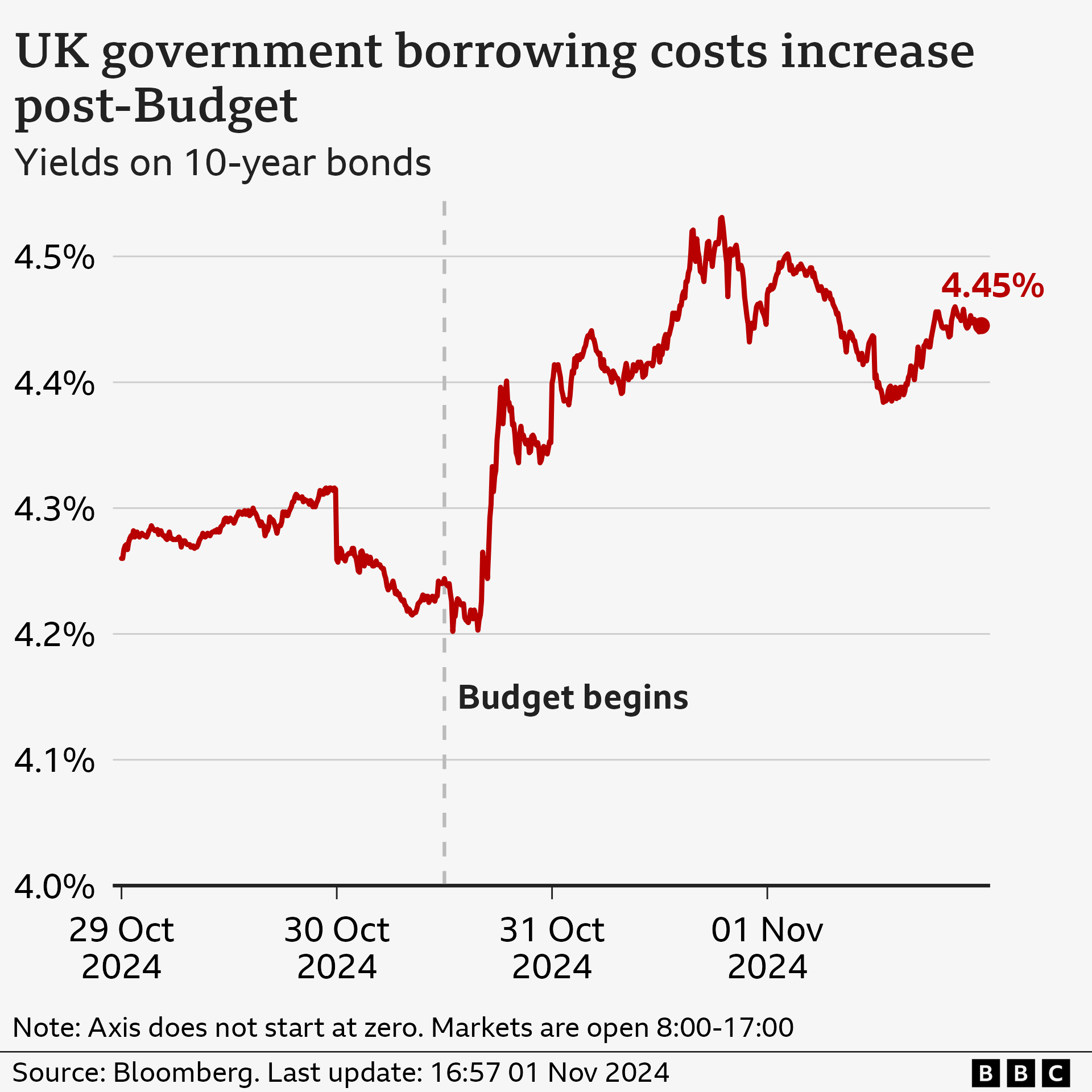Investors' reaction to Budget 'very different' to Truss

- Published
Rachel Reeves' Budget is "very, very different" to the Liz Truss mini-Budget of two years ago, according to a senior government minister.
Chief Secretary to the Treasury Darren Jones's comments were designed to reassure markets following a rise in the cost of government borrowing and a fall in the pound in the wake of Wednesday's Budget.
The amount the government has to pay lenders has risen after the chancellor announced a big increase in government borrowing to finance spending projects, sparking fears it may need to raise even more money.
Jones told the BBC it had put in place new rules to make sure spending on public services was paid for by tax receipts "not borrowing every single month".
He said investors always reacted to Budgets because they "present a whole load of new information".
"We've all got a bit of anxiety from what happened when Liz Truss was in government.
"We've got strong fiscal rules in place so that day-to-day spending on public services is paid for by tax receipts, not borrowing every single month, which is what the last government did, and we've got a strong investment rule that means that while we're investing in the country, debt is falling as a share of the size of the economy."

The interest rate – the so-called yield – the government has to pay lenders when it borrows money from them over a 10-year period, for example, climbed just above 4.52% on Thursday, its highest level for a year, before falling back to 4.45% on Friday.
The 10-year bonds are regarded as being the benchmark measure of how much the government has to pay to borrow.
The yield on the shorter term two-year bonds - which are usually more sensitive to market announcements - saw similar movements.
UK government bonds or gilts are regarded as being one of the safest forms of investment because it is thought very unlikely the government would not be able to repay the money.
If the yield rises, it is a signal that investors see it as being riskier to lend the government money.
This matters because not only does it mean the government will have to pay more to borrow, but bond yields are also used as a guide for setting the rates on everyday loans and mortgages.
The knock-on effects of the Reeves Budget were already being felt in the market, said David Hollingworth, from mortgage broker L&C.
Initially some smaller lenders withdrew mortgages, but they have been followed by bigger, mainstream lenders, with Skipton and Coventry building societies both announcing fixed rate increases to take effect early next week.
“It’s confusing times for mortgage borrowers when expectation is for a base rate cut [by the Bank of England] next week but fixed rates look set to rise," said Mr Hollingsworth.
However, if market rates remain at current levels, he said it looked "inevitable" that more lenders would have to rethink their rates.
"Borrowers currently considering a fixed-rate option should move quickly to secure a deal as we’re seeing some rates withdraw with very little notice.”
Faisal Islam: Rachel Reeves doesn’t mind if you don't like her Budget
- Published31 October 2024
House sales forecast to 'jump' ahead of stamp duty rise
- Published1 November 2024
However, it is important to put the latest market movements in context.
The initial moves on the bond and currency markets were about a tenth of the size of those seen after the mini-Budget, which was delivered by Kwasi Kwarteng while Liz Truss was prime minister.
For example, the pound fell 0.8% against the dollar, to a two-month low, but by 17:00 GMT on Friday had settled to about 0.5% lower.
By comparison, in the aftermath of the mini-Budget the pound fell 8% against the dollar - to an all-time low.
There has also been a wider rise in borrowing costs over the past month, but that has been a global movement, led by the US.
On Friday, Reeves said she would not comment on market moves "because markets move all the time".
However, she added the IMF had given the Budget a “clean bill of health”, and the independent official forecaster, the Office for Budget Responsibility, had said it met fiscal rules.
In the Budget, Reeves announced nearly £70bn of extra spending a year, funded by tax increases for business and extra borrowing.
Susannah Streeter, head of money and markets at Hargreaves Lansdown, said the investor reaction had also been sparked by an expecation that interest rate cuts would now be scaled back, given forecasts that the Budget could push up inflation over the next two years.
"Financial markets are now not expecting rates to fall below 4% until 2026," she said.